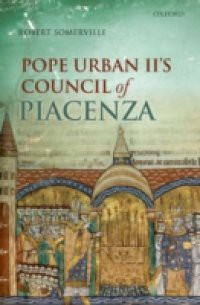The Council of Piacenza is among the most important moments of the Reform that was sweeping through the Western Church at the end of the eleventh century. It is often regarded as a launching pad for the First Crusade, though the matter is obscure and serves only to hide the assembly's true significance as a turning point in the papal schism between Popes Gregory VII/Urban II and the so-called anti-pope Clement III. The canons promulgated at Piacenza became landmarksnot only for the eleventh- and twelfth-century Reform, but more broadly for the Church of the High Middle Ages and even beyond. Robert Somerville situates Piacenza in historical context, discusses the sources, the attendance, and the need for a new edition of the legislation. The official canons are lost, but several dozen twelfth-century manuscripts were consulted for a new edition of these provisions. The account finishes with a commentary on Piacenza's legislation and a discussion of the subsequent legislation of Urban II's synods. Somerville completes the picture of what can be known about the papal synods of one ofthe most influential Roman pontiffs of the Middle Ages.

